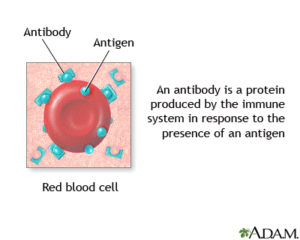Leukemia |
||
DefinitionLeukemia is a type of blood cancer that begins in the bone marrow. Bone marrow is the soft tissue in the center of the bones, where blood cells are produced. The term leukemia means white blood. White blood cells (leukocytes) are used by the body to fight infections and other foreign substances. Leukocytes are made in the bone marrow. Leukemia leads to an uncontrolled increase in the number of white blood cells. The cancerous cells prevent healthy red cells, platelets, and mature white cells (leukocytes) from being made. Life-threatening symptoms can then develop as normal blood cells decline. The cancer cells can spread to the bloodstream and lymph nodes. They can also travel to the brain and spinal cord (the central nervous system) and other parts of the body. Leukemia can affect children and adults. Leukemias are divided into 2 major types:
The main types of leukemia are:
ReferencesAppelbaum FR. Acute leukemia in adults. In: Niederhuber JE, Armitage JO, Doroshow JH, Kastan MB, Tepper JE, eds. Abeloff’s Clinical Oncology. 5th ed. Philadelphia, PA: Elsevier Saunders; 2014:chap 98. Campana D, Pui CH. Childhood leukemia. In: Niederhuber JE, Armitage JO, Doroshow JH, Kastan MB, Tepper JE, eds. Abeloff’s Clinical Oncology. 5th ed. Philadelphia, PA: Elsevier Saunders; 2014:chap 96. |


